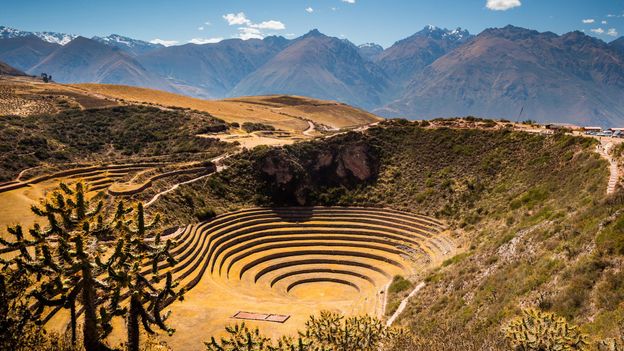The innovative technology that powered the Inca
[ad_1]
Ultimately, the andenes, stocks, and quipus helped the Inca gradually expand an empire that eventually dominated much of South America, encompassed 12 million people, and produced majestic citadels such as the Machu Picchu.
But the arrival of the Spanish conquistadors in the 16th century triggered the overthrow of the Incas and the decline of the Andenes. Colonial violence, European disease epidemics and forced displacement devastated the indigenous populations of the central Andes. European crops and farming practices were introduced and quickly spread throughout the region.
Yet while many andenes have been abandoned or fallen into disuse, they never completely disappeared. Drawing on knowledge passed down through generations, many Andean farmers continue to use them today, and although often overlooked by travelers, they remain a common sight in places such as Isla del Sol and La wider region of Titicaca, the sacred valley near Machu Picchu, and the Colca Canyon in southern Peru, a crack twice as deep as the Grand Canyon.
In recent years, there has been a resurgence of academic interest in andenes as a form of sustainable agriculture that could help the world cope with the climate crisis, water scarcity and erosion. soils. The Food and Agriculture Organization of the United Nations, for example, describes traditional Andean culture as “one of the best examples of farmers’ adaptation and knowledge to their environment”, and stresses its sustainable approach to land use, water management, soil protection and crop biodiversity.
Four thousand five hundred years after their appearance, the terraced fields of the Andes seem to be ahead of their time.
Ancient Engineering Marvels is a BBC travel series that draws inspiration from unique architectural ideas or ingenious constructions constructed by civilizations and cultures of the past across the planet.
–
Join over three million BBC Travel fans by liking us on Facebook, or follow us on Twitter and Instagram.
If you liked this story, subscribe to the weekly newsletter on bbc.com features called “The Essential List”. A hand-picked selection of stories from BBC Future, Culture, Worklife and Travel, delivered to your inbox every Friday.
[ad_2]


Comments are closed.